| THE
LOUIE REPORT
December
2004
Notes
from Eric Predoehl, producer of upcoming documentary
posted
December 23, 2004 (all rights reserved)
It’s a cold December night as I
unleash these words to the open airs of the vast cyberspace.
What a wild year it’s been for the producers of
the LOUIE LOUIE epic, and the world in general. These
have been challenging times, and we all do what we can
to move things forward. Professionally speaking, things
continue to be very exciting for the Octalouie
production team. We’ve had the pleasure to
work for some very prestigious clients whose work has
inspired us over the years. We’ve shot more footage
for the LOUIE documentary, and met some wonderful contacts
whom we look forward to working with in the future.
Last month, I suffered a bit of a setback
with a dislocation injury that put me on the sidelines
for awhile. Having never gone through this sort of thing
before, it certainly provided me with a new perspective
on disabilities, and a greater appreciation for those
in the healing profession. I am so very grateful for
finding an excellent physical therapist. With any luck,
I hope to be completely healed within the next few months.
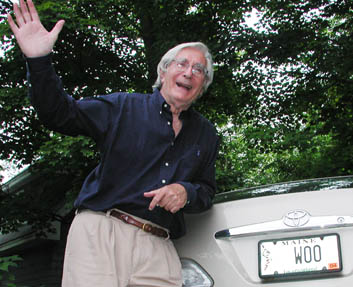 On
the LOUIE front, we’ve been able to document some
great stories in the past six months. This summer, I
felt fortunate to conduct an interview with legendary
Boston disc jockey Arnie “Woo Woo”
Ginsburg. Arnie was the disc jockey responsible
for breaking LOUIE LOUIE nationally when he showcased
the Kingsmen recording as the “Worst
Record of the Week.” Boston was one of the biggest
national markets, and Arnie was the top disc jockey
of the region, commanding a 40% market share of the
airwaves. On
the LOUIE front, we’ve been able to document some
great stories in the past six months. This summer, I
felt fortunate to conduct an interview with legendary
Boston disc jockey Arnie “Woo Woo”
Ginsburg. Arnie was the disc jockey responsible
for breaking LOUIE LOUIE nationally when he showcased
the Kingsmen recording as the “Worst
Record of the Week.” Boston was one of the biggest
national markets, and Arnie was the top disc jockey
of the region, commanding a 40% market share of the
airwaves.
The type of radio show that Arnie had
in the early 1960’s was radically different from
the radio you’d hear nowadays. Arnie was quite
a character on the radio, combining goofball comedy
schtick with cheesy sound effects, and a musical play
list made up entirely of his own design. This was the
type of radio programming that the public adored, and
Arnie profited nicely. It’s unlikely that we’ll
ever hear anything like this again on commercial radio.
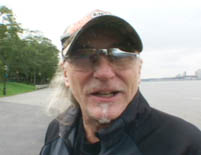 In
the fall, co-producer Jesse Block conducted
an interview with Ian Lloyd, former
singer with the Stories. In 1973, the
Stories had a hit single with “Brother Louie,”
a song originally performed by Hot Chocolate.
Many people have confused “Brother Louie”
with LOUIE LOUIE, as there are some common phrasings
in both songs. In
the fall, co-producer Jesse Block conducted
an interview with Ian Lloyd, former
singer with the Stories. In 1973, the
Stories had a hit single with “Brother Louie,”
a song originally performed by Hot Chocolate.
Many people have confused “Brother Louie”
with LOUIE LOUIE, as there are some common phrasings
in both songs.
Ian has had a colorful career as a member
of Stories, a solo artist, and guest vocalist for such
musicians as Foreigner, Billy
Joel, Peter Frampton, Yes,
and Ian McDonald. Ian is still doing
music with his latest band Social Hero,
which plays around New York City. In fact, he’s
got a new version of “Brother Louie” that
you can hear at the MachineDreamRecords
website. There's also a site
dedicated strictly to the music of Ian Lloyd.
 In
other record business news, Ace Records
just released three important CDs for the connoisseurs
of Richard Berry music- “The
Ultimate Flairs,” new Richard Berry collection
entitled “Yama Yama! The Modern Recordings 1954-1956,”
and a Sonics CD single covering Richard’s “Have
Love Will Travel.” In
other record business news, Ace Records
just released three important CDs for the connoisseurs
of Richard Berry music- “The
Ultimate Flairs,” new Richard Berry collection
entitled “Yama Yama! The Modern Recordings 1954-1956,”
and a Sonics CD single covering Richard’s “Have
Love Will Travel.”
In the 1950’s, Modern Records
was one of the most important rhythm and blues labels,
providing some prominent musicians with their first
serious recording contracts- B.B. King,
John Lee Hooker, Etta James,
and Richard Berry, to name a few. When
Richard signed to Modern, he was a member of a popular
vocal group from Jefferson High School of South Central
Los Angeles. As it was often common for a record company
to name a group after a label, this group was given
the title of “The Flairs,”
borrowing the name from the Flair label that was previously
used as a showcase for country hillbilly music. The
Flairs became one of the most influential groups of
the West Coast doo wop scene, providing an excellent
starting point for Richard and bandmates Cornel
Gunter, Obie Jessie, Peter
Fox and Beverly Thompson.
This new compilation titled simply “The
Ultimate Flairs,”collects some of
the finest tracks from this group, both under the original
group name and the subsequent pseudonyms.
“Yama
Yama! The Modern Recordings 1954-1956”
is an impressive upgrade to “Get Out of
the Car,” a 1982 Ace Records LP release
that came out on CD in 1992. Focusing on Richard’s
solo recordings from the Modern Records company, this
new collection features upgraded audio, some alternative
recordings, and more extensive liner notes. One of the
tracks on this new CD is a previously unreleased instrumental
written by Richard. As this newly-discovered song did
not have an actual name, the folks at Ace decided to
give it a most unusual title. The title that gave this
song is something that I’m both slightly embarrassed
by, yet at the same time, honored by such attention.
I won’t tell you the name of track #26, but when
you see this
CD, you’ll see what I’m talking about.
It's very silly…
The Sonics
CD-single of “Have Love Will Travel”
was designed to cash in on the recent usage of this
song for the new Land Rover television
commercials. Richard wrote this song as a semi-sequel
to LOUIE LOUIE, and this recording by the great Northwest
band of the 60’s is a classic archetype of garage
rock at it’s very finest. I applaud Land Rover
for embracing superior rock music for their advertising
campaign, and I hope this will help spur renewed interest
in this great band. For those that need to hear more,
I would refer folks to the Ace compilation “Psycho-Sonic”
or some of the many Norton
Records
releases that feature this amazing band.
If you aren’t
able to find these CDs at your friendly neighborhood
music store, which I’d encourage
you to support, then I’d like you to consider
ordering from the CD Universe or
Amazon
links on the side of this newsletter, which should provide
me with a small percentage if things are working properly.
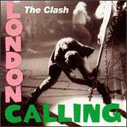 One
unexpected archival recording of LOUIE LOUIE emerged
when Sony released a 25th
Anniversary edition of the Clash “London
Calling” album. The new edition has been expanded
to a 3 disc set, featuring one CD that includes the
entire original 2 album set on one little silver platter,
one CD of alternative recordings of the songs, and one
DVD with video footage of concert and rehearsal performances.
The version of LOUIE LOUIE in this collection is not
part of second CD featuring alternative recordings and
outtakes, but instead can be found on the DVD, where
we get a chance to see rare footage of the band when
they recorded this album back in 1979. As one watches
the shaky black and white footage documenting this event,
we are treated to a spontaneous rendition of LOUIE LOUIE
by the Clash, accompanied by their manic producer, Mr.
Guy Stevens, who decides to toss a
chair, and jump around like an absolute loon. A classic
moment if I ever saw one! One
unexpected archival recording of LOUIE LOUIE emerged
when Sony released a 25th
Anniversary edition of the Clash “London
Calling” album. The new edition has been expanded
to a 3 disc set, featuring one CD that includes the
entire original 2 album set on one little silver platter,
one CD of alternative recordings of the songs, and one
DVD with video footage of concert and rehearsal performances.
The version of LOUIE LOUIE in this collection is not
part of second CD featuring alternative recordings and
outtakes, but instead can be found on the DVD, where
we get a chance to see rare footage of the band when
they recorded this album back in 1979. As one watches
the shaky black and white footage documenting this event,
we are treated to a spontaneous rendition of LOUIE LOUIE
by the Clash, accompanied by their manic producer, Mr.
Guy Stevens, who decides to toss a
chair, and jump around like an absolute loon. A classic
moment if I ever saw one!
Collectors of underground recordings
will probably remember the “other” version
of LOUIE LOUIE by the Clash, recorded during the Sandinista
sessions, released on various pirate releases. This
is entirely separate rendition of the song.
 There’s
been some new interest in digital radio, thanks in part
to disc jockey Howard Stern, who made
big headlines when he signed a multi-million dollar
contract with the Sirius Satellite Radio Network.
As it turns out, Howard’s not the only one that
made the big move to the FCC-free airwaves of Sirius.
Back in October, author Dave Marsh
(creator of the LOUIE LOUIE book, Rap ‘n’
Rock Confidential, and a ton of other music books) made
the big plunge with a new show entitled “Kick
Out the Jams!” With a tip of the hat to MC5
for the title, this show jumps headfirst into the intersection
of music and politics. To quote from the man himself,
here’s a description of what to expect: There’s
been some new interest in digital radio, thanks in part
to disc jockey Howard Stern, who made
big headlines when he signed a multi-million dollar
contract with the Sirius Satellite Radio Network.
As it turns out, Howard’s not the only one that
made the big move to the FCC-free airwaves of Sirius.
Back in October, author Dave Marsh
(creator of the LOUIE LOUIE book, Rap ‘n’
Rock Confidential, and a ton of other music books) made
the big plunge with a new show entitled “Kick
Out the Jams!” With a tip of the hat to MC5
for the title, this show jumps headfirst into the intersection
of music and politics. To quote from the man himself,
here’s a description of what to expect:
“I plan to be myself-- despising
Bush, disdaining Democrats, fighting the war, looking
for things that sound like freedom, attacking injustice
(ranging from the demolition of the Tennessee public
health care system to the exclusion of Lynyrd Skynyrd
from the R&R Hall of Fame), and delighting, always,
in the music and what it brings to our lives.
Sirius requires specific equipment and a subscription.
On the other hand, it doesn't have to kowtow to the
FCC so adult humans (or even the kids, who have rights,
too) get to speak the way people speak in real life
and I don't have to hunt down a "brothers and
sisters" version of the theme song. And there's
no advertising, so that much less to fear in the way
of pressure to conform.
Ideas welcome. Except maybe for, ‘Don't do this,
you idiot.’"
Another addition to the Sirius network
is one of my favorite musical satirists, Mr. Mojo
Nixon. Mojo made mark with such memorable melodies
as “Elvis Is Everywhere,” "Debbie Gibson
Is Pregnant With My Two-Headed Love Child," and
“Burn Down the Malls,” to name but a few.
A few months ago, Mojo got a new gig as an afternoon
on-air host for the commercial-free Outlaw Country channel.
To recycle another press release (which
makes my job so much easier), the format of Outlaw Country
was created by Executive Producer Little Steven
Van Zandt. "Outlaw Country is a sanctuary
for the freaks, misfits, outcasts, rebels and renegades
of country music," said Little Steven. "In
other words, Mojo Nixon has finally found a place where
he belongs. We welcome him to the Sirius family with
great pride and greater trepidation."
In a time when the American government
fines outrageous sums of money for those that use naughty
words on radio or television, I applaud Sirius for providing
a real alternative. Nobody should be forced
to listen or watch anything that offends them,
and more people should
learn how to use an “OFF” button
rather than demanding censorship for all.
I hope there will always be a place
for radio programs like the ones that Dave, Steven,
and Mojo have created.
As time marches on, we lose a lot of
good people. I could spend a lot of time writing all
the good people we’ve lost in the past year, but
I’ll keep the focus on those in the LOUIE circle,
which is substantial.
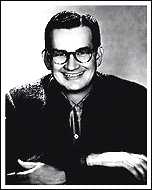 Hunter
Hancock was the very first disc jockey to ever
play LOUIE LOUIE on the airwaves when he broadcast Richard
Berry’s version for the Los Angeles community
in 1957. Hunter was recognized as the very first disc
jockey in the western United States to spin rhythm and
blues records and among the first to broadcast rock
'n' roll. Hunter died of natural causes at the age of
88 at a retirement complex in Claremont, California. Hunter
Hancock was the very first disc jockey to ever
play LOUIE LOUIE on the airwaves when he broadcast Richard
Berry’s version for the Los Angeles community
in 1957. Hunter was recognized as the very first disc
jockey in the western United States to spin rhythm and
blues records and among the first to broadcast rock
'n' roll. Hunter died of natural causes at the age of
88 at a retirement complex in Claremont, California.
The DooWop
Society of Southern California hosted a
great
tribute to Hunter Hancock back in March 2000. There
was some wonderful music that night with Big
Jay McNeely, Jeanette Baker,
Johnny Flamingo, The Calvanes,
The Hollywood Saxons, Vernon
Green & The Medallions, and Jewel
Akens. A lot of great words were said about
Hunter Hancock, and the City of Los Angeles presented
a certificate of appreciation to this music legend.
It was quite a nice night, and I’m very fortunate
to have been there.
Hunter may have left the planet of the
living, but you can hear his voice if you can track
down a copy of the CRUISIN'
59 LP, or the Doo-Wop From Dolphin’s
of Hollywood, Vol. 1 CD. The DooWop
Society of Southern California has a wonderful biography
written by the man himself, as well as a lot of great
photographs. There's also an official HunterHancock.org
site.
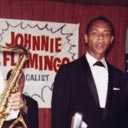 At the same event where I met Hunter, I also met Johnny
Flamingo and Jeanette Baker,
who were good friends with Richard Berry. Johnny died
nine months later in December 2000. Last month, there
was an
excellent article in the UK Guardian
about a son’s quest to find about Johnny Flamingo,
the father he never knew. It’s a heartfelt story
well worth reading.
At the same event where I met Hunter, I also met Johnny
Flamingo and Jeanette Baker,
who were good friends with Richard Berry. Johnny died
nine months later in December 2000. Last month, there
was an
excellent article in the UK Guardian
about a son’s quest to find about Johnny Flamingo,
the father he never knew. It’s a heartfelt story
well worth reading.
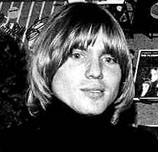 One man that did a lot of work to promote the legacy
of garage rock was Mr. Greg Shaw, founder
of Bomp!
Records. As a journalist, and owner of
an independent record label, Greg spent a lifetime championing
the cause for the type of music we now call “garage
rock.”
One man that did a lot of work to promote the legacy
of garage rock was Mr. Greg Shaw, founder
of Bomp!
Records. As a journalist, and owner of
an independent record label, Greg spent a lifetime championing
the cause for the type of music we now call “garage
rock.”
In the mid-1960’s, he started “Mojo-Navigator
Rock & Roll News,” a magazine that
predated Rolling Stone and featured such unknown critics
as Lester Bangs, Greil Marcus
and Dave Marsh (him again!). In the
early 1970’s, he started another publication called
“Who Put the Bomp” and also worked at United
Artists Records. When one of his favorite bands,
the Flamin’ Groovies couldn’t
get a decent record contract, Greg started his own Bomp
record label, and unleashed “Shake Some Action”
as the very first release. After getting the Groovies
signed to Sire Records, he accompanied
the band for an adventure in England, where he was one
of the first Americans to witness an obscure band known
as the Sex Pistols. Over the years,
Greg promoted and recorded a lot of important bands,
including Iggy Pop & the Stooges,
the Germs, Sky Saxon,
the Pandoras, Brian Jonestown
Massacre, the Crawdaddys,
and the Fuzztones, to name but a few.
Greg died on October 19th of heart failure
at the age of 55. He had some complicated health problems,
and underwent a pancreas/kidney transplant in 1999.
Steven Van Zandt, host of the syndicated radio show
"Little Steven's Underground Garage” (see
previous Sirius paragraph), made a public statement
soon after Greg’s death:
"He was an extraordinarily
important individual in the history of rock 'n' roll
. He was literally responsible for the contemporary
garage-rock movement, which he single-handedly started
with the Bomp! label."
You can more
about Greg at the Bomp webpage. There’s also
an
excellent tribute by Chip Lamey at
the videocrypt.com pages.
 Cookie
Holley was a kind spirit that I met via the
internet. She was an old friend of Richard Berry
from the 70’s, and she was very happy to see some
heartfelt tributes acknowledging his legacy. Cookie
had a very interesting personal history. She told me
that she was a cousin to Buddy Holly, but I can’t
remember the full connection. In her rather colorful
life, Cookie was a dancer, teacher, writer, graphic
designer, make-up artist, actress, and activist. While
living in Hollywood, she spent 14 years serving as Metaphysical
Minister for the RAM Center, receiving two doctorates
and a Ph.D.. At one point of her life, she was also
married to Otis Hill, Jr., a drummer
and cousin to blues legend, Z.Z. Hill. Cookie
Holley was a kind spirit that I met via the
internet. She was an old friend of Richard Berry
from the 70’s, and she was very happy to see some
heartfelt tributes acknowledging his legacy. Cookie
had a very interesting personal history. She told me
that she was a cousin to Buddy Holly, but I can’t
remember the full connection. In her rather colorful
life, Cookie was a dancer, teacher, writer, graphic
designer, make-up artist, actress, and activist. While
living in Hollywood, she spent 14 years serving as Metaphysical
Minister for the RAM Center, receiving two doctorates
and a Ph.D.. At one point of her life, she was also
married to Otis Hill, Jr., a drummer
and cousin to blues legend, Z.Z. Hill.
In 1998, she had created her own independent
music label, BumpNgrind Records, which
led to the creation of three internet radio stations
and an alliance of approximately 150 disc jockeys known
as BumpNgrind
Radio. In May 2002, she
testified at the United States Senate Committee
on the Judiciary on the subject of copyright royalties
and webcasting. Her
testimony is part of public record at the official Senate
webpages.
Cookie died alone at the age of 58 in
a small house located in an Oregon forest, surrounded
by her pets and computers. Her body was discovered sometime
in June. I didn’t find out about her death until
a few months later. She will be missed.
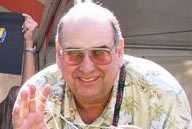 The
comic book and doo-wop communities of the Los Angeles
region lost a great ally when Bill Liebowitz
died in October. Bill owned the Golden
Apple comic
stores, which were a great place for pop culture
aficionados like myself. When I lived in Los Angeles
in 1997, the Golden Apple on Melrose was one of my favorite
places to visit, and everyone that worked at the store
always made me feel so darned comfortable. Bill provided
some of the coolest events of the area, providing a
showcase for various cartoon artists, writers, small
press publications, authors of music history books,
scream queens, rock stars, actors, and even some yo-you
experts. At Bill’s store, it was always a very
casual place to meet good people that might happen to
be famous. At Bill’s store, we were all customers,
and fans of the “good stuff,” which was
in abundance at this hot spot of fun pop culture. The
comic book and doo-wop communities of the Los Angeles
region lost a great ally when Bill Liebowitz
died in October. Bill owned the Golden
Apple comic
stores, which were a great place for pop culture
aficionados like myself. When I lived in Los Angeles
in 1997, the Golden Apple on Melrose was one of my favorite
places to visit, and everyone that worked at the store
always made me feel so darned comfortable. Bill provided
some of the coolest events of the area, providing a
showcase for various cartoon artists, writers, small
press publications, authors of music history books,
scream queens, rock stars, actors, and even some yo-you
experts. At Bill’s store, it was always a very
casual place to meet good people that might happen to
be famous. At Bill’s store, we were all customers,
and fans of the “good stuff,” which was
in abundance at this hot spot of fun pop culture.
On the sidewalk in front of the Golden
Apple, there were always a couple of chairs available
for a friendly chat. I remember a particularly nice
time I had when Bill invited me to sit with him in these
chairs and tell him all about my documentary project.
I had such a nice time chatting with him. Bill had a
knack for making you feel as if you knew him for years,
even if you barely knew the guy.
If you’d like to read more about
Bill, and his legacy, you should definitely check out
the Golden
Apple Comics website, and Mark
Evanier's News From Me site.
I’m sure there’s more I could
report for the 2004 wrap-up, but I think I’ll
leave some news for a future update. In 2005, there
will be an addition of a LOUIE LOUIE blog, which means
current news will be added to these pages on a more
regular basis. Currently, the way things are structured,
it takes me quite a bit of time to assemble each LOUIE
update. I hope to have the new blog in place within
the next few months.
My
thanks again for all of the people
that shared their comments, questions, and stories for
THE MEANING OF LOUIE. Your input is greatly appreciated.
In the meantime, I want to wish all a happy holidays.
Me gotta go now,
ERIC
PREDOEHL
All
images & words copyright 1999-2004 Eric Predoehl
/ OCTALOUIE, LLC, except as noted. All rights reserved.
The term "LOUIE LOUIE" is a registered trademark
of RMB, Inc, a company owned by The Kingsmen, the band recognized for turning
the song into the monster icon heard all over the world.
|
